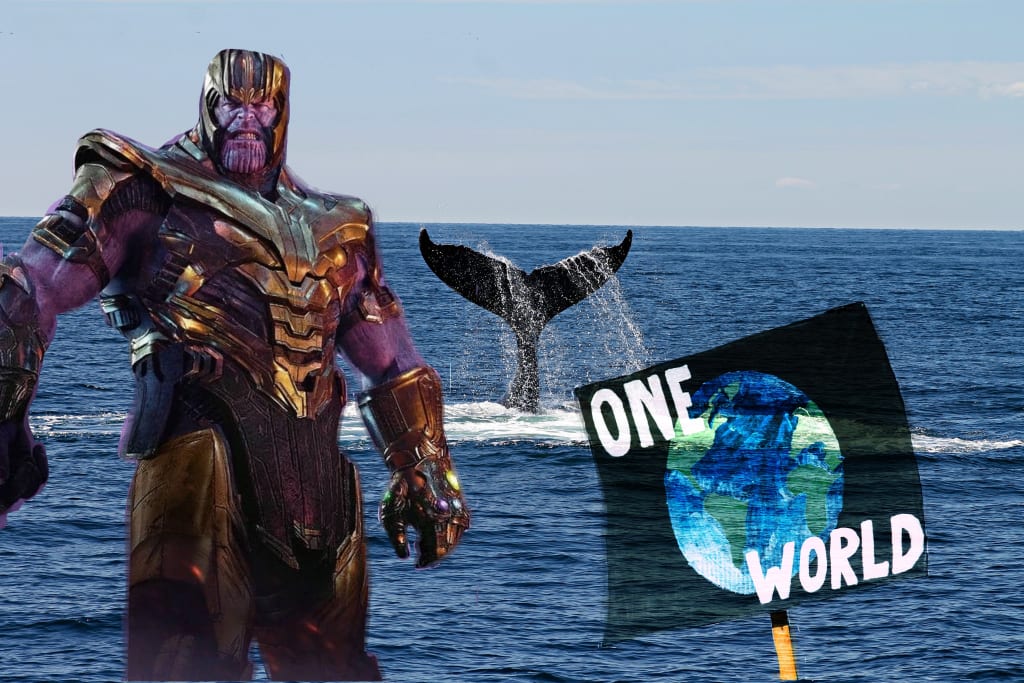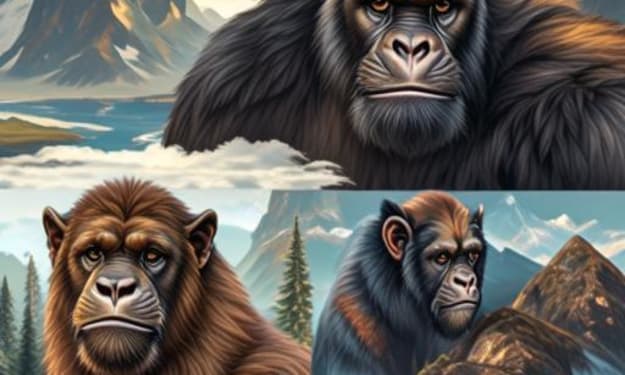Was Thanos Right About Saving Earth?
On Whales in the Hudson, Overpopulation, Ocean Destruction and Climate Change

The most memorable antagonists are the ones that make you reconsider your position on an issue. They are not evil for evil's sake but operate from a moral compass that, while unpopular, is entirely understandable and at least partially agreeable. In this regard, Thanos stands out. If you are unfamiliar with the Marvel Cinematic Universe (MCU), Thanos (huge purple dude, weird chin) is an overarching villain who first makes an appearance in the first Avengers movie in a post-credits scene. His presence remains enigmatic as the heroes move from film to film, but as the universe expands, the audience is able to piece together little nuggets of information about him.
He finally bursts onto the scene in full in Avengers: Infinity War and reveals his master plan: he wants to cleanse Earth by wiping half of its life from the planet. Thanos believes that life on Earth has become unsustainable due to increasing pressures on the planet's resources that are insufficient to meet the needs of the people who live there. As a result of this resource scarcity, humans wage wars against each other, new diseases crop up every day, and most of the world's population lives in squalor. Thanos...is a climate activist? Spoiler if you haven't seen Infinity War yet, but he succeeds.
He snaps 3.8 billion people out of existence, and from an environmentalist standpoint, it seems to work. Barring the bleak aftermath of the death of loved ones, the planet appears to be in good ecological shape, and Captain America even muses that he observed a pod of whales swimming in the Hudson River in New York. Do you know how filthy the Hudson River is? Not one whale but a whole pod of them! This begs the question: is the issue of ocean pollution a population problem? Are there simply too many of us, and will all our problems be solved by a purge-like phenomenon that obliterates the majority of life on the planet? Was Thanos, for all his pomp and circumstance, right after all?
Infinite Snaps and Malthusianism
Thanos may not have known it at the time, but his worldview aligned perfectly with an ecological view of the planet that is over 200 years old. Malthusianism posits that while the rate of agricultural production is linear, population growth is exponential. In other words, the earth's population, in theory, will eventually outpace its rate of food production, leading to a dearth of resources and the eventual death of the human race through widespread starvation and poverty. Thomas Malthus (the brain behind this idea) further suggests a link between societal happiness and prosperity and the ratio of available food resources to population growth. Malthusianism and its offshoots are thoroughly concerned (much like our massive, purple friend) with overpopulation and advocate for the enforcement of various means of population control.
Little one, it’s a simple calculus. This universe is finite, its resources, finite… if life is left unchecked, life will cease to exist. It needs correction.
- Thanos, Avengers: Infinity War
These views informed several attempts at coercive population management worldwide, including China's past one-child policy and India's covert male sterilization campaigns in the 1970s. Both approaches were terrible, and much like Thanos' attempt to manage the Earth's population, they failed. Spectacularly. But why? These policies disproportionately targeted poor, minority groups and, in the case of China, unintentionally resulted in an uptake in selective abortions geared towards ensuring male births. Thanos' Malthusian sentiments towards Earth, while well-meaning (I guess?), were deeply flawed. It's all well and good to target population growth by exterminating the population itself, but without analyzing the root causes of this growth, nothing changes.
Seriously. Humans are like bunnies. We eat, sleep, hump each other and produce offspring. Snap 3.8 billion of us out of this world? Give us some alcohol, a Marvin Gaye album and 40 years, and we'll be right back to square one. Not to mention that arbitrarily eliminating half of the world's people ignores one crucial fact about climate change and ocean pollution: the carbon footprints of the world's industrial countries far outweigh that of lesser developed countries in the Global South. In fact, in 2020, 18 industrial countries produced 77% of the world's CO2 emissions. There are 195 countries in the world, in case you were wondering about the ridiculous nature of that stat. But sure, let's equally blame the small-scale subsistence farmers in rural India and throughout Africa who walk everywhere and have negligible CO2 emissions for our ocean pollution problems. Instead of the A/C-blasting, food-wasting, two car-having, single-use plastic-dumping folk of the Global North. Makes perfect sense, Thanos.
Humans Destroy But We Build, Too
I will concede to Thanos' assessment of human beings. We are selfish, destructive, and the architects of our own demise. We take more than we need, often at the expense of others. We dump our trash into the deep blue with little regard for the creatures that live there. We horde food and wealth while hunger and famine ravage the vulnerable majority. And often, we don't realize the error of our ways until some immense tragedy occurs (see The Bengal Famine of 1943, the Rwandan Genocide or any number of avoidable conflicts). But in the aftermath, we reconstruct, and the brilliant minds among us concoct grand schemes to ensure that the tragedies of the past are not brought forth into the future.
In this regard, we are the Avengers. We pick up the pieces in the after. The movies in the MCU are epic and action-packed, but I can't help thinking that (almost) all of their problems are self-inflicted. Devastate New York and create a villain who's a slighted, out-of-work construction worker. Obliterate a country and spawn a foe whose wife and child were collateral damage. Be a dick to a nerdy scientist and have him return a decade later in a suave suit to demolish you and your girlfriend. At that point, we are fighting demons of our own making. Ocean pollution kind of feels like that. It's an uphill battle with a mighty adversary capable of destroying life as we know it. It knows exactly where to hit us the hardest and is intimately familiar with our weak points because, well, we fed the monster. Spawned and baptized it in our greed and selfishness. Now, how do we fix the conundrum we've roped ourselves into before it destroys us? Can we avenge our oceans before they consume us?
We Are Groot
I could ramble on about the individual actions I take every day to keep my carbon emissions to a minimum and reduce my contributions to the pollution of our vast oceans. I shop with a mountain of reusable bags in tow. I own reusable water bottles, straws, coffee mugs and Tupperware. I reduce, reuse and recycle (in that order). I don't eat meat. I walk everywhere and only use public transportation about once a month to drag myself to the bank or medical appointments. I don't own a car (mainly because I cannot afford one and I don't know how to drive). I rarely purchase new clothes and prefer to mend broken items and thrift "new" ones. I use reusable menstrual products. My trusty menstrual cup and period panties are monthly lifesavers, and if no one stops me, I can sing their praises for ages. I, I, I, me, me, me and at the end of it all, these intentional acts are but a blip on the radar of climate change.
I credit Marvel's Guardians of the Galaxy for making me fall in love with a tree. If you've never seen the Guardians movies, that sentence was probably bizarre. Essentially, there's a sentient tree named Groot who repeats a single phrase throughout the film: "I am Groot." When he inevitably sacrifices his life to save his friends (spoiler, kind of), he says, "We are Groot," and this is silly, but I cried. The phrase "We are Groot" highlights the crux of the climate change issue and the consumer consciousness at the forefront of the ocean conservation movement: individual actions are fruitless unless scaled by politics and collective advocacy.
Climate change is scary. The prospect of hostile oceans, rising sea levels and obliterated coastlines is scary. The release of long-dead diseases through melting permafrost is scary. When is it ever pleasant to face your fears alone? The idea that the onus for saving the oceans is solely on individual consumers is ludicrous and likely falls into the trap of greenwashing. Greenwashing, you know, when things that seem eco-friendly and great for the state of our oceans are actually wolves in sheep's clothing. Like plastic recycling. Or "sustainable" activewear assembled in inhumane factories. A better and more powerful play is consistency in advocacy and demanding accountability from the politicians representing us. They have the power to make real change, and we have the power to demand that they do.

Avengers Assemble
“I thought by eliminating half of life, the other half would thrive, but you have shown me… that’s impossible. As long as there are those that remember what was, there will always be those, that are unable to accept what can be. They will resist.”
- Thanos, Avengers: Endgame
We are the Avengers. The Pre-vengers? The handle-business-before-it-handles-us-vengers. We don't take sh*t lying down. Never have. And we're needed now more than ever. Thanos was fundamentally wrong in both his assumptions and execution of population extermination. But he was correct that we have a major climate debt on our hands that will require payment in the years to come. Earth is our home, our sanctuary, and it is in grave danger. The ocean that protects us and helps sustain us is dying, and we, collectively, have the power to fix it. We only lack the will. Every last one of us is needed, so AVENGERS ASSEMBLE (I've always wanted to say that!).
---------------------------------------------------
If you liked this post, please be sure to like this post! If you're able to leave a small tip, it'd be greatly appreciated and also, feel free to check out some of my latest stories. I recommend starting with this one:
About the Creator
Laquesha Bailey
22 years old literally, about 87 at heart. I write about self care, university life, money, music, books and whatever else that piques my interest.
@laqueshabailey







Comments
There are no comments for this story
Be the first to respond and start the conversation.